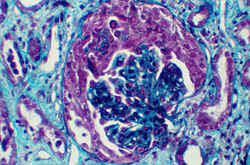 RPGN is a nephrologic emergency, and one of the more exciting consult cases for nephrologists to participate in. Much like dealing with a stroke or heart attack, delays in initiating therapy can lead to substantially worsened outcomes. Prompt initiation of therapy can be exceptionally challenging in RPGN, as even patients with advanced renal compromise may feel clinically well (as opposed to a stroke or a heart attack), and convincing them to accept aggressive therapies such as plasma exchange can be tough. Furthermore, for patients who present acutely, we don’t always have as much data as we would like to help make a decision. Unfortunately, waiting for renal biopsy results or serologies to come back before making the decision to treat glomerulonephritis can result in costly delays.
RPGN is a nephrologic emergency, and one of the more exciting consult cases for nephrologists to participate in. Much like dealing with a stroke or heart attack, delays in initiating therapy can lead to substantially worsened outcomes. Prompt initiation of therapy can be exceptionally challenging in RPGN, as even patients with advanced renal compromise may feel clinically well (as opposed to a stroke or a heart attack), and convincing them to accept aggressive therapies such as plasma exchange can be tough. Furthermore, for patients who present acutely, we don’t always have as much data as we would like to help make a decision. Unfortunately, waiting for renal biopsy results or serologies to come back before making the decision to treat glomerulonephritis can result in costly delays.
Empiric Management of Suspected RPGN
For this reason, any patient suspected of acute RPGN–defined as having an acutely elevated creatinine along with an active urine sediment–should be treated empirically.
Most patients in this situation can be treated solely with a steroid pulse–e.g., Solu-Medrol 0.5-1 gm iv qd x 3 days–while waiting for serologies to come back and scheduling a renal biopsy.
However, the presence of some specific clinical symptoms–pulmonary hemorrhage, CNS vasculitis, or mononeuritis multiplex–warrants a more aggressive empiric approach. In addition to the steroid pulse, we typically initiate urgent plasma exchange and often consider beginning Cytoxan right off the bat.


hello sir , i am pediatric nephrology resident at RML hospital at new delhi india. we have a 14 yr old male presenting as nephrotic syndrome turning out to be MPGN.he went into RPGN and we gave him 6 pulses of methyl pred and did the biopsy.now we also have given him cyclophosphamide.his BUN & creat have decreased , Hypertention is decreasing. but the oedema is not decreasing …
my question is what is the time period for response of the oedema ???
patient has started having haematuria again after cyclophosmide.is it a good sign or a bad one ???
Steroid pulses, urgent plasma exchange and Cytoxan right off the bat: in our centre, like many others in Europe, we use this treatment regimen too. However, evidence about its safety and efficacy is lackig. In the Mepex trial, pts treated with PEX did not recieve steroid pulses.
Moreover, immunoglobuin replacement may be necessary in immunosuppressed pts on PEX because of the potential risk of hypogammagloblinaemia. We use IVIg 100 mg/kg after each PEX session.
u do not mention abt the kidney size in rpgn.
I found your approach to therapy on RPGN rather insightful. However as a medical student, I find a great deal of confusion while I read the different disorders that affected the kidney. Basically the different types of glomerulonephritis like, RPGN, membranoproliferative glomerulomephritis, focal segmental glomerulosclerosis,mesangiocapillary glomerulonephritis,etc. I find them etiologically and pathologically confusing. I would appreciate your advice so as to how I am to seggregate them properly for better understanding.